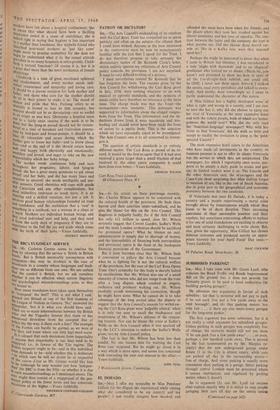EL DORADO
SHL—May I offer my sympathy to Miss Penelope Gilliatt for the disgust she experienced while visiting what she considered to be my country and my people? I can readily imagine how shocked and offended she must have been when her friends, and the places where they took her, crashed against her liberal sensibility and her love of equality. The con- trast between the latter and the company she kept is what puzzles me. Did she choose those horrid ver- min or, like in a Kafka tale, were they imposed upon her?
Perhaps she might be interested to know that when I came to Britain last October, I was introduced to a lady 'alight with diamonds' and to an 'elegiacal' gentleman who invited me to dinner ('Black tic, you know') and promised to show me how in spite of all the I'm-all-right-Jack rubbish, one could still be ONE. I never saw them again. Inatepd, I walked the streets, read every periodical and talked to every- body. And slowly, most rewardingly so, I came to partly understand the character of this nation.
If Miss Gilliatt has a highly developed sense of what is right and wrong in a society, and I am ever so sure she has it, why did she choose to carry out her trial of Venezuela at the most expensive hotel and with the richest people, both of which are homo- geneous the world over? Why did she only read the 'American-language' newspaper? Why with her 'fever to find Venezuela' did she walk so little and accept so readily the invitation to jump in the 'gold- sprayed Lincoln"?
The most expensive hotel caters to the Americans who have made oil investments in the country; its business purpose is not to offer its clients Venezuela but the service to which they are accustomed. The newspaper, for which I regrettably once wrote, pur- ports to be simply a daily guide to stocks and gos- sip; its limited readers want it so: The Lincoln and the other American cars, the skyscrapers and the Coca-Cola (how surprising that Miss Gilliatt forgot to mention it) are, like in the rest of South America, due in great part to the geographical and economic proximity between the two countries.
If Venezuela was once El Dorado, it is today a country and a people experiencing a moral crisis brought about by instantaneous wealth which they know to ' be of short duration. Their increasing awareness of their unenviable position and their resolute, but sometimes contrasting, efforts to replace it for one of solid foundations are exciting to observe and most certainly challenging to write about But, alas, given the opportunity, Miss Gilliatt has chosen dubious cicerones and produced merely an appro- priate travesty for your April Fools' Day issue.- Yours faithfully,
ISAAC CHOCR6N
96 Palatine Road, Manchester, 20


































 Previous page
Previous page